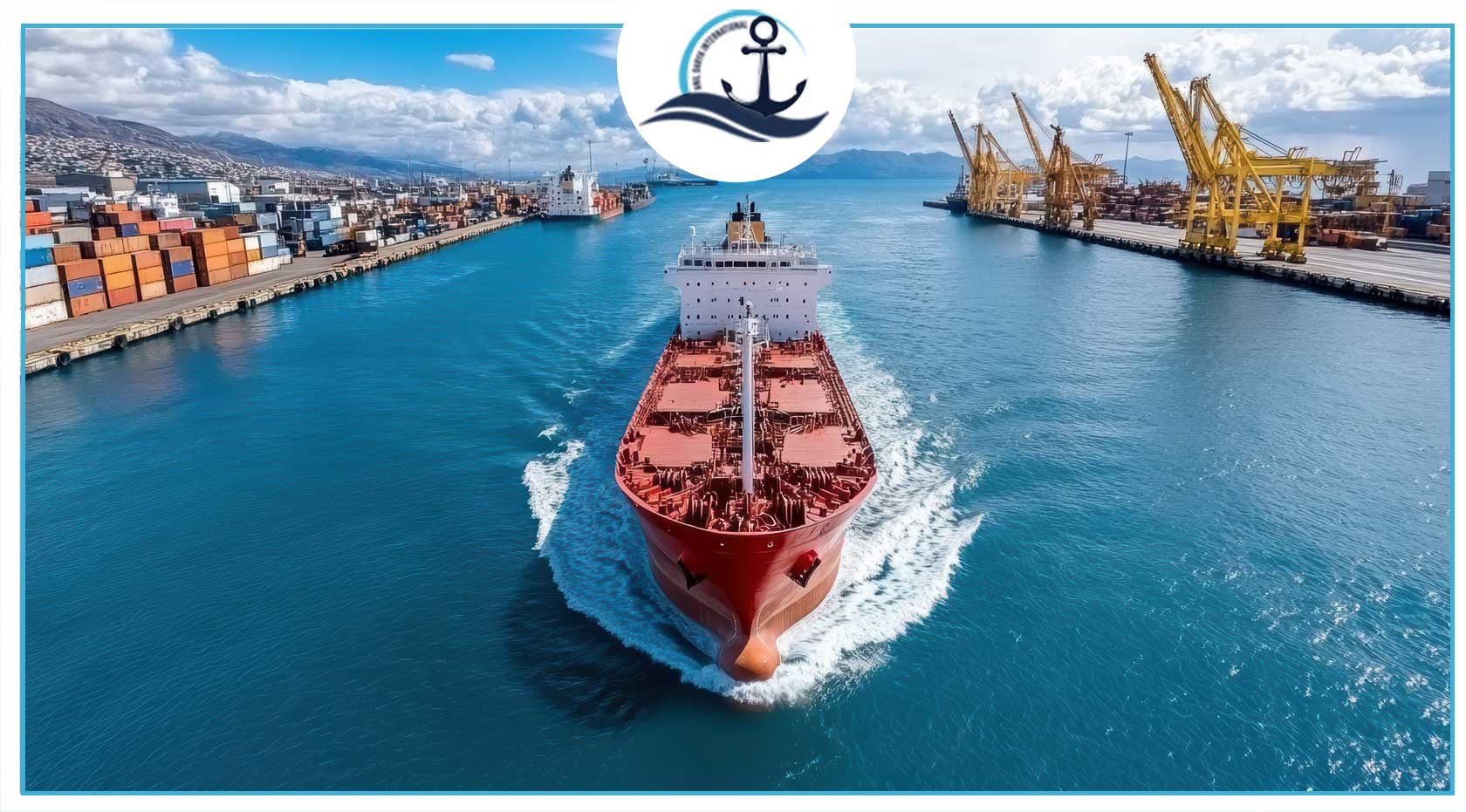

The Vital Role of Bulk Cargo in Global Trade
In today’s world, where global supply chains are expanding rapidly, the movement of large, unpackaged goods has become one of the main pillars of international trade. Bulk cargo is an efficient answer for the needs of traders, manufacturers, and trading companies that must transport raw materials, agricultural products, minerals, fuel, or chemicals in massive volumes between countries. Instead of using standard containers, this method allows goods to be loaded directly onto bulk carriers, thereby reducing packaging and loading operation costs.
For importers and exporters working with major markets such as Dubai, China, India, or European ports, bulk shipping means a lower total landed cost, faster clearance, and flexibility in shipment volume. Anil Darya Shipping—with extensive experience in international transport and a powerful network of logistics partners at key ports—is considered one of the most reliable options for managing this type of cargo.
Definition and History of Bulk Cargo
Bulk cargo refers to the transportation of goods that are loaded in large quantities, without packaging or containers, onto specialized vessels. This method emerged in the nineteenth century alongside the growth of intercontinental trade in grains, coal, and minerals. At that time, steamships created the first large spaces for bulk movement and enabled the transfer of millions of tons of raw materials from Asia and America to Europe. Over time, with technological advances, today’s bulk carriers have been equipped with modern loading and discharge systems and can move dry or liquid cargoes in volumes of several hundred thousand tons.
Unlike containerized shipping, which places goods in standardized units, bulk shipping loads materials directly into the ship’s holds. This high level of flexibility allows traders to move their cargo without container constraints; however, compliance with safety standards, moisture control, ventilation, and international regulations is essential to prevent potential damage.
Types of Bulk Cargo and Commercial Applications
Bulk cargo is divided into three categories:
Dry Bulk
Liquid Bulk
Break Bulk
Dry Bulk:
Includes wheat, rice, corn, soybeans, coffee, coal, iron ore, cement, and chemical fertilizers. These products are usually transported in volumes of tens of thousands of tons and are vital for the food, steel, energy, and agricultural industries.
Liquid Bulk:
Oil products, liquefied gases (LNG/LPG), edible oils, chemicals, and petrochemical products fall into this category. Liquid bulk carriers are equipped with special tanks that enable safe storage and temperature control.
Break Bulk
Goods that require initial packaging but are not shipped in containers—such as timber, large industrial equipment, or heavy machinery.
Dubai’s Advantage:
Dubai—especially Jebel Ali Port—due to its modern equipment and strategic location, is the primary transit hub for all three bulk categories in the Middle East.
Bulk Carriers and Loading/Discharge Equipment
To move massive volumes of bulk goods, special vessels known as bulk carriers are designed. These ships are classified by cargo type into several groups:
- Handy Size and Handymax: Capacity around 20,000 to 50,000 tons, suitable for small ports or shallow routes.
- Panamax:Designed to pass through the Panama Canal with a capacity of about 60,000 to 80,000 tons.
- Capesize:Giant ships with capacities over 100,000 tons used for transporting iron ore and coal on oceanic routes.
- VLBC and ULBC: Ocean behemoths with capacities of several hundred thousand tons for transporting crude oil and liquid cargoes.
Loading dry bulk is typically performed via massive conveyor belts, suction loaders, or port cranes. For liquid bulk, dedicated pipelines with safe pumping systems and temperature control are used. Discharge at the destination also uses similar equipment and is closely supervised to prevent contamination or spillage.
The Complete Bulk Shipping Process: From Contract to Final Delivery
Bulk shipping is a multi-stage project that requires precise management from the moment an agreement is made with the cargo owner until final delivery at destination. The key stages are:
Initial Consultation
Vessel Selection
Contract & B/L
Cargo insurance
Origin Port Loading
Sea transit
Discharge & Clearance
Needs assessment and initial consultation
Anil Darya evaluates the cargo type, volume, destination, and specific sensitivities (moisture, temperature, hazardous nature).
Selecting the right vessel
Based on tonnage and cargo characteristics, the bulk carrier type and shipping route (for example, Dubai–Bandar Imam Khomeini) are determined.
Contracting and issuing the Bill of Lading
The transport contract is concluded and the necessary documents—including the Bill of Lading—are issued.
Cargo insurance
Comprehensive policies are chosen to protect the cargo’s value against maritime risks.
Loading at the port of origin
Operations are carried out in compliance with international standards and quality control.
Sea transit
The vessel is continuously monitored during the voyage, and weather conditions, temperature, and cargo humidity are checked.
Discharge and customs clearance at destination
Upon arrival at the destination port, the cargo is discharged, clearance documents are prepared, and the goods are delivered to the owner.
Anil Darya Shipping utilizes specialized teams throughout these stages to monitor safety, control documentation, and expedite clearance so customers receive their goods with minimal risk and delay.
International Regulations Governing Bulk Shipping
Due to the large volumes and potential hazards, bulk shipping is overseen by international bodies and local laws:
IMO (International Maritime Organization): Develops maritime safety regulations and standards for dry and liquid bulk.
SOLAS: Safety requirements for ships to protect human life and cargo at sea.
ISPS Code: Security standards for ports and ships to prevent terrorist incidents or smuggling.
UAE Regulations (UAE Federal Transport Authority): Specific requirements for handling chemicals and dangerous goods at Jebel Ali Port.
With a precise understanding of these regulations, Anil Darya prepares the necessary documents and permits and conducts transport in accordance with the latest requirements to minimize legal risks and additional costs.
Cost Factors in Bulk Shipping
The final cost of bulk shipping depends on multiple factors. Understanding these helps traders plan their finances accurately:


Cargo type
Sensitive or hazardous goods (such as chemicals or liquid bulk) require special equipment and incur higher costs.
Weight and volume
The higher the tonnage, the lower the rate per ton, but the total cost increases.
Distance and route
Long routes or transits through canals such as Panama or Suez add extra costs.
Season and market conditions
Freight rates rise during peak export seasons for grains or fuel.
Insurance and additional services
Broader insurance coverage or specialized customs services affect the price.
For example, transporting 50,000 tons of grain from Chinese ports to Bandar Imam Khomeini (Iran) may cost USD 30–50 per ton depending on global rates and the time of year. Transporting liquid chemicals is usually more expensive due to the need for specialized vessels.
Anil Darya Shipping, by providing accurate pro forma invoices and transparent consulting, helps clients choose the best combination of price, time, and services.
Bulk Cargo Insurance and Risk Management
The large scale of bulk shipments means any incident can result in significant financial loss. Severe storms, weather fluctuations, leakage of liquid cargoes, or contamination of dry bulk are among the common risks on international routes. Therefore, bulk cargo insurance plays a vital role in protecting traders’ capital.
Common types of insurance in this field include
- All Risk Insurance:Comprehensive coverage for various potential damages during transit.
- Named Perils Insurance: Coverage for specific risks such as fire, explosion, or storms.
- Carrier’s Liability Insurance: Compensation in cases of negligence by the carrier or port personnel.
- VLBC and ULBC: Ocean behemoths with capacities of several hundred thousand tons for transporting crude oil and liquid cargoes.
Anil Darya Shipping, in cooperation with international insurers, offers the best insurance options tailored to the cargo type and route. The company’s experts handle all documents and procedures for issuing the policy so owners can conduct their business without concern over potential risks.
Key Criteria for Choosing a Bulk Shipping Company
Selecting a reliable partner in bulk shipping makes a decisive difference between success and failure in commercial projects. Some critical criteria include:
Experience and track record: A company with a strong résumé on international routes can expedite clearance and transport more safely.
Access to a diverse fleet: Having vessels from Handy Size to Capesize enables the selection of the optimal capacity for the cargo type.
Compliance with international standards: Adherence to IMO, SOLAS, and ISPS ensures the safety of cargo and personnel.
Financial transparency: Accurate pro forma invoices and clear contracts reduce potential disputes.
Multi-service support: The ability to provide complementary services such as container shipping, multimodal options, or dangerous goods handling creates significant added value.
Anil Darya Shipping meets all these criteria. With a wide network at key ports such as Shanghai, Shenzhen, Jebel Ali, and major Iranian ports, the company provides comprehensive services from vessel selection to customs clearance. In addition to bulk, Anil Darya’s team also offers specialized sea freight and even air freight for sensitive or time-critical cargoes—an advantage that allows clients to manage all logistics needs from a single point.
Anil Darya’s Competitive Advantages in Bulk Shipping
Free, expert consultation
Rapid price quotes
24/7 Customer Support
Global Network
Complementary services
Free, expert consultation: Commercial specialists propose the best route and vessel for each type of cargo.
Rapid price quotes: Ability to receive an accurate pro forma invoice in the shortest time.
24/7 support: A support team ready to answer questions and track the shipment throughout the journey.
Extensive international network: Cooperation with reputable shipping lines to ensure competitive rates and reliable scheduling.
Complementary services: Comprehensive insurance, dangerous goods handling, containerized sea freight, and air freight for multimodal needs.
Conclusion
As one of the most important methods of moving large-volume goods in international trade, bulk shipping demands experience, equipment, and strict compliance with standards. By choosing a reliable partner, costs can be optimized and potential risks minimized. Anil Darya Shipping, with a global network, diverse fleet, and professional team, is ready to transport your bulk cargo from China, the UAE, Europe, and other ports to UAE safely, quickly, and economically.
Frequently Asked Questions (FAQ)
Grains, coal, iron ore, cement, liquid chemicals, crude oil, and edible oils.
Depending on the vessel type, from several thousand to tens of thousands of tons; however, Anil Darya can also handle smaller consignments with Handy Size vessels.
Yes, for certain sensitive or urgent cargoes, part of the route can be handled by air to reduce delivery time.
Usually between 3 and 7 days, depending on the destination port.
Yes, in compliance with IMO standards and using properly equipped vessels.
The Bill of Lading, Certificate of Origin, commercial invoice, and insurance certificate are the primary documents.
Yes, bulk carriers are equipped with systems to monitor temperature, humidity, and location.
Yes, All Risk policies are offered for comprehensive coverage against incidents.
You can receive a quote and expert consultation via the contact form on the website or by calling directly.
